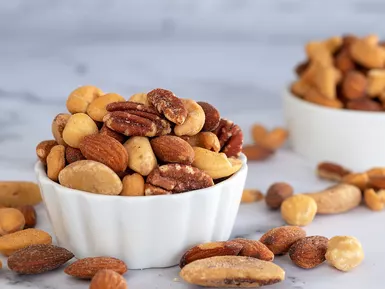
The Power of Social Support in Weight Loss
Losing weight is a journey that involves more than just diet and exercise. It requires a holistic approach that addresses both the physical and psychological aspects of weight management. One crucial element that often gets overlooked is social support. In this blog post, we will explore why social support is key for weight loss and where you can find it.
The Physiology and Psychology of Weight Loss
Before delving into the importance of social support, let's first understand the underlying physiology and psychology of weight loss. At its core, weight loss is a matter of energy balance. When you consume fewer calories than your body burns, you create a calorie deficit, which leads to weight loss. However, this process is not as simple as it sounds.
The human body is a complex system that is designed to maintain a stable weight. When you start a weight loss program, your body senses the change in calorie intake and responds by slowing down your metabolism. This is known as metabolic adaptation, and it can make it more difficult to lose weight. Additionally, factors such as hormones, genetics, and lifestyle can also influence your weight loss journey.
On the psychological side, weight loss can be a challenging and emotional process. Many people turn to food for comfort or as a way to cope with stress, which can make it difficult to stick to a healthy eating plan. Emotional eating can also lead to feelings of guilt and shame, which can further undermine your motivation and confidence.
The Importance of Social Support
Social support plays a crucial role in weight loss by providing emotional, physical, and practical assistance. When you have a strong support system in place, you are more likely to stay motivated, committed, and accountable to your weight loss goals. Here are some ways that social support can help you lose weight:
- Emotional Support: Losing weight can be a rollercoaster ride of emotions. Having someone to talk to, share your struggles, and celebrate your successes can make a big difference in your motivation and confidence. Whether it's a friend, family member, or support group, having a listening ear can help you stay on track and avoid emotional eating.
- Physical Support: Social support can also provide you with the physical motivation and encouragement you need to stay active. Whether it's going for a walk with a friend, joining a fitness class, or participating in a weight loss challenge, having a workout partner can make exercise more fun and enjoyable. Additionally, having someone to hold you accountable can help you stay consistent and committed to your exercise routine.
- Practical Support: Losing weight often requires making lifestyle changes, such as cooking healthy meals, planning your workouts, and managing your time. Having a support system in place can provide you with the practical assistance you need to make these changes. Whether it's helping you with grocery shopping, providing you with healthy recipe ideas, or offering to watch your kids while you exercise, having someone to support you can make the weight loss process more manageable.
Where to Find Social Support
Now that you understand the importance of social support in weight loss, the next question is where to find it. Here are some places where you can find social support for your weight loss journey:
- Friends and Family: Your friends and family can be a great source of support and encouragement. Share your weight loss goals with them and ask for their help and support. They can provide you with emotional support, help you stay accountable, and even join you in your weight loss journey.
- Support Groups: Joining a support group can be a great way to connect with others who are going through similar experiences. Whether it's a local weight loss group, an online community, or a support group for a specific health condition, having a group of people to share your struggles and successes with can be very motivating and helpful.
- Health Professionals: Your doctor, dietitian, or personal trainer can also provide you with valuable support and guidance on your weight loss journey. They can help you develop a personalized weight loss plan, provide you with nutrition and exercise advice, and monitor your progress to ensure that you are on track.
- Workplace Wellness Programs: Many workplaces offer wellness programs that include weight loss support and resources. Check with your employer to see if they offer any wellness programs that you can participate in.
Unique Insights and Strategies for Weight Loss
In addition to the importance of social support, there are several unique insights and strategies that can help you lose weight. Here are some tips to keep in mind:
- Metabolic Typing: Everyone's metabolism is different, and what works for one person may not work for another. Understanding your metabolic type can help you develop a personalized weight loss plan that is tailored to your specific needs and goals.
- Non-Scale Victories: While the number on the scale can be a good indicator of your progress, it's important to remember that weight loss is not just about losing pounds. Non-scale victories, such as increased energy, improved sleep, and reduced stress, can also be important indicators of your overall health and well-being.
- Mindful Eating: Mindful eating is a practice that involves paying attention to your food, eating slowly, and savoring each bite. By practicing mindful eating, you can become more aware of your hunger and fullness cues, which can help you avoid overeating and make healthier food choices.
- Behavior Change: Losing weight requires making lifestyle changes, such as eating a healthy diet, exercising regularly, and managing stress. By focusing on behavior change rather than just weight loss, you can develop healthy habits that will last a lifetime.
Science-Based Weight Loss Tips
In addition to the unique insights and strategies mentioned above, there are several science-based weight loss tips that can help you achieve your goals. Here are some tips to keep in mind:
- Set Realistic Goals: Setting realistic goals is important for motivation and success. Aim to lose 1-2 pounds per week, which is a healthy and sustainable rate of weight loss.
- Eat a Balanced Diet: Eating a balanced diet that is rich in fruits, vegetables, whole grains, lean proteins, and healthy fats is essential for weight loss. Avoid processed foods, sugary drinks, and excessive amounts of saturated and trans fats.
- Control Your Portion Sizes: Controlling your portion sizes is an important part of weight loss. Use smaller plates, bowls, and utensils, and measure your food to help you control your portions.
- Stay Hydrated: Drinking plenty of water is important for overall health and weight loss. Water can help you feel full, boost your metabolism, and flush out toxins from your body.
- Get Enough Sleep: Getting enough sleep is important for weight loss. Lack of sleep can disrupt your hormones, increase your appetite, and lead to weight gain.
One-Day Weight Loss Meal Plan Example
Here is an example of a one-day weight loss meal plan that is balanced, nutritious, and delicious:
- Breakfast: Scrambled eggs with spinach and tomatoes, whole grain toast, and a glass of water
- Snack: Apple slices with almond butter
- Lunch: Grilled chicken salad with mixed greens, cucumbers, tomatoes, and feta cheese, and a glass of water
- Snack: Carrot sticks with hummus
- Dinner: Baked salmon with roasted vegetables (broccoli, cauliflower, and carrots), and a glass of water
- Dessert: Greek yogurt with berries and a drizzle of honey
This meal plan provides approximately 1,500 calories per day, which is a healthy and sustainable amount for weight loss. It is also rich in protein, fiber, vitamins, and minerals, which are essential for overall health and well-being.
Frequently Asked Questions (FAQ)
Q: How can I overcome emotional eating?
A: Emotional eating is a common challenge that many people face when trying to lose weight. To overcome emotional eating, it's important to identify your triggers and develop healthy coping mechanisms. Some strategies that can help include practicing mindfulness, engaging in physical activity, talking to a friend or family member, or seeking professional help.
Q: What should I do if I hit a weight loss plateau?
A: Hitting a weight loss plateau is a common occurrence when trying to lose weight. To overcome a weight loss plateau, it's important to make some changes to your diet and exercise routine. Some strategies that can help include increasing your physical activity, reducing your calorie intake, trying a new exercise routine, or consulting with a healthcare professional.
Q: How can I stay motivated and committed to my weight loss goals?
A: Staying motivated and committed to your weight loss goals can be challenging, but it's important to remember why you started in the first place. Some strategies that can help include setting realistic goals, tracking your progress, rewarding yourself for your achievements, surrounding yourself with positive people, and seeking support when needed.
Conclusion
In conclusion, social support is a crucial element in the weight loss journey. By having a strong support system in place, you can stay motivated, committed, and accountable to your weight loss goals. Whether it's friends, family, support groups, or health professionals, having someone to support you can make a big difference in your success. Additionally, by understanding the physiology and psychology of weight loss, and by implementing unique insights and strategies, you can increase your chances of achieving your weight loss goals. Remember, losing weight is a journey, not a destination, and with the right support and mindset, you can achieve your goals and live a healthier, happier life.
Call to Action
If you're ready to start your weight loss journey, we encourage you to take the first step today. Whether it's joining a support group, consulting with a healthcare professional, or making some small changes to your diet and exercise routine, every little bit helps. Remember, you don't have to do it alone. With the right support and mindset, you can achieve your goals and live a healthier, happier life.

5 Transformative Weight-Loss Resolutions for Success

Workout Routines & Beyond: Science-Based Weight Loss

Vitamin E and Weight Loss: Unveiling the Truth

Effective Strategies to Lose Midriff Fat for Women

8 Non-Scale Victories in Your Weight-Loss Journey

Unveiling the Ornish Diet: A Path to Sustainable Weight Loss

The Power of Social Support in Weight Loss

Personalized Weight Loss: 4 Strategies for Success

Long - Term Weight Loss: Maintaining Healthy Habits

